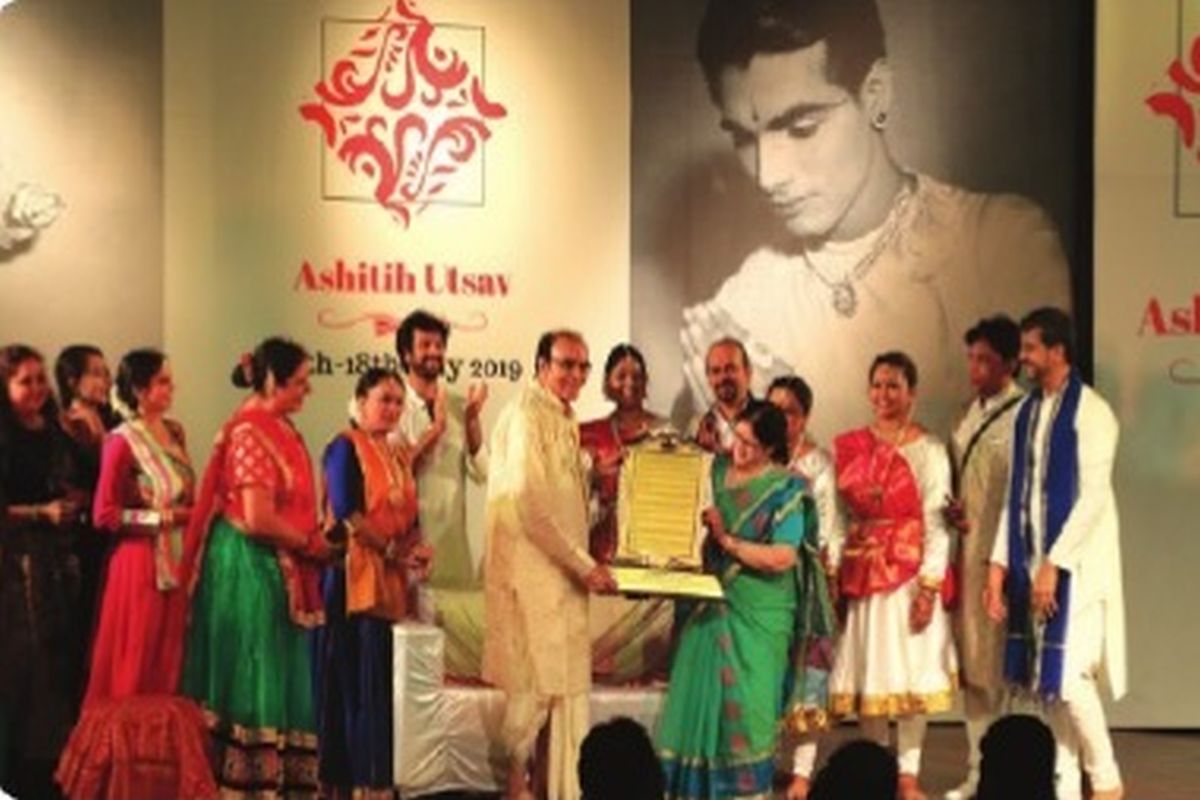Sri Ram Mādhurya: A unique Kathak-Katha-Kutcheri by Sunil Sunkara & Vanitha Suresh
Brahma Gana Sabha witnessed the premiere of “Sri Ram Mādhurya” on 3 January this year, during their Marghazi Dance Festival.
He had served as Professor and Head of the Dance Department at Bhatkhande University, Lucknow, and as Dean, Faculty of Arts, at Indira Kala Sangeet Vishwa Vidyalaya, Khairagarh, teaching and guiding several research scholars for their doctoral thesis.
Manjari Sinha | New Delhi | July 26, 2019 2:30 am

The Dhiroddhat character of demon Mahishasur, juxtaposed with the Samharini and Karunamayi images of the Vishwamohini Devi Durga, was depicted with remarkable indepth Abhinaya. (SNS)
The 80th Birthday Celebrations of Kathak exponent and Guru Puru Dadhich was an enriching experience. A review by Manjari Sinha.
Mahamahopadhyay Puru Dadhich, a proficient Kathak exponent, choreographer and Guru, is also an erudite scholar of Natyashastra, having equal command over the Shastra and Prayog, the theory and practical aspects of dance. His significant contribution in the field of Kathak is also writing the syllabus for Kathak for Universities and books according to the syllabus for degree courses.
Advertisement
He had served as Professor and Head of the Dance Department at Bhatkhande University, Lucknow, and as Dean, Faculty of Arts, at Indira Kala Sangeet Vishwa Vidyalaya, Khairagarh, teaching and guiding several research scholars for their doctoral thesis. Conferred with the prestigious Sangeet Natak Akademi Award, Shikhar Samman of the Madhya Pradesh government and Maha Mahopadhyay from A B Gandharva Mahavidyalaya Mandal to name just a few, he deserved to be celebrated on his 80th birthday with a befitting “Ashitih Utsav”.
Advertisement
The two-day Ashitih Utsav, held at Indore, comprised a National Seminar on the contributions of Puru Dadhich in the field of dance, literature and shastras, an audio CD launch of his precious compositions, Gundecha Brothers singing his Dhrupad compositions and his disciples performing his compositions and choreographies, the proper ritual of “Samman Patra Arpan” with devotional fervour and ultimately the Kathak recital by the 80-years-young, Puru Dadhich himself.
The day long seminar on 17 July, chaired by Vidushi Shovana Narayan had Purnima Pande sharing her association with him at the Bhatkhande Music Institute, deemed University, Lucknow; Sandhya Purecha deliberating on his connecting Natya Shastra with Prayog or the practical aspect; this critic (Manjari Sinha), redefining the Kathak education system, analysing his systematic contribution to this field; Pt Vijay Shankar Mishra on Puru Dadhich popularising the Aprachalit Talas; Bishan Kumar on Dadhich as his friend philosopher and guide; Riddhi Mishra underlining his contribution as a Guru, choreographer and performer; and Sunil Sunkara continued on documenting Kathak for next generation, bridging worlds through the written words of Dadhich with dynamic demonstration and a dramatic delineation of “Sheshpnan…”, taking the daylong seminar to its comely climax.
The evening performances, animatedly compered by Sunil, opened with Ganesh- Vandana, written, composed (in ragaHamsadhwani set to Jhaptala) and choreographed by Puru Dadhich; presented by Pallavi Vyas and group from Rajkot. The 12 names of Ganesh were incorporated in this Stotra, where even the opening Kavitta ended with the Tihai of “Pranam Dha”.
The Antaradescribed Him as Nada-Brahma-Swaroop, where the composer incorporated a Bindadin Kavitta, adapting it to the 10-matra time cycle of Jhap-tala. The lost Katha-Kathan style of ancient Kathak, which was revived by Dadhich in “Hum Katha sunate hain…”, was articulated by Rashyashri Sodha in “Durga Charitam”, translated from Durga Saptashatiand chorepgraphed by Dadhich.
The Dhiroddhat character of demon Mahishasur, juxtaposed with the Samharini and Karunamayi images of the Vishwamohini Devi Durga, was depicted with remarkable indepth Abhinaya. The music of this item, composed by Mukundraj Dev in ragas Durga, Bageshri, Rageshri and the concluding Hamsadhwani in “Jaya Janani Bhavani…” set to 11-beats cycle of Ashta- Mangal Tala, did full justice to the emotional content of “Durga-Charitam”.
The “Siva-Dhrupad” in raga Malkauns, set to the challenging 28-beats cycle of Brahma-tala, was presented by his Mumbai-based disciples, Piyush Raj, Devesh Mirchandani, Ankur Balal, Shruti Saraf, Anuradha Shah, Simran Khurana and Amryta Gupte. The beauty of this unique composition was that there was always a “Khai” on the ending of names or attributes of Shiva like “Kar” in Shankar and Pralayankar or Dhar in Damaru-dharand so on. The evening dance presentations concluded with “Yatimala” by Kshama Malviya and students.
This was composed by Dadhich in raga Bhupali like a “Lakshan- Geet” that went “Yatimala suno Sajan…”, describing different Yatis with their particular gaits. The CD launch of the veteran’s compositions came next for the benefit of music lovers, particularly the Kathak dancers at home and abroad. The felicitation ceremony, along with the Pada-Puja, Malyarpana and Arati with a glittering Thaalof 80 lamps, climaxed in the “Maan-Patra”, presented by his senior-most disciple Vibha Dadhich.
The function/festival continued with Gundecha Brothers presenting three rare Dadhich compositions in incredible Talas like Manthika of 13-beats cycle in ragaGaud Sarang, TalaBasant of nine-beats cycle in Malkauns and the Dhrupad composition set to Brahma-tala of 28 beats cycle, sung in Kirwani accompanied on Pakhawaj by Pt Akhilesh Gundecha. The day-long celebration reached its climax with the heart-rending rendition of “Kevat-Prasang”, by none other than the Birthday-Boy, Maha Mahopadhyay Puru Dadhich himself, that got him a standing ovation.
The melodious vocal rendering from Ramcharitmanas by Purvi Nimgaonkar and Mayank leading the live orchestra enhanced his Kathak performance and intense Abhinaya. The second day of the Ashitih Utsav saw students from all over, offer ing “Arghya” to their Guru, dancing to his written and choreographed compositions.
Advertisement
Brahma Gana Sabha witnessed the premiere of “Sri Ram Mādhurya” on 3 January this year, during their Marghazi Dance Festival.
Discover Bollywood actresses who have mastered classical dance forms, blending acting talent with cultural artistry.
It was the Bengali New Year, and Naatmandir was celebrating the culmination of spring and summer through their homage to nature and universal creativity at the Rathindra Mancha Auditorium in Jorasanko Thakurbari.
Advertisement
